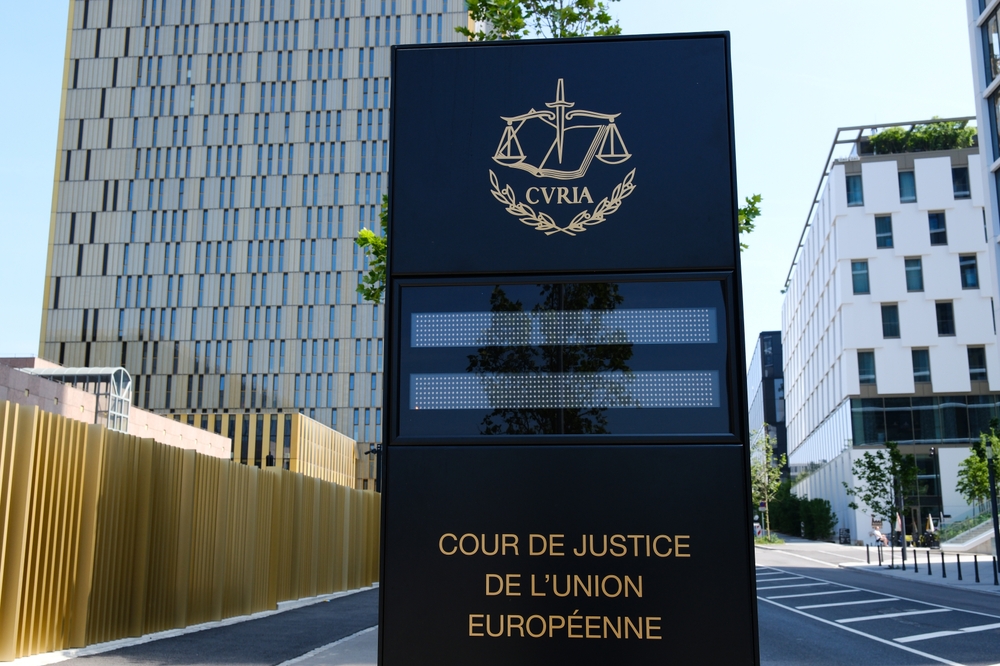
In the first week of September, the Court of Justice of the European Union (CJEU) handed down a landmark ruling that has a direct impact on Romania and other EU member states. The European court ruled that a European arrest warrant (EAW) cannot be ignored or turned into a mere formality, and that states where fugitives find refuge can no longer take over the enforcement of the sentence without the explicit consent of the country that issued the custodial sentence. In other words, Spain, Italy, Greece, or France will no longer be able to offer “shelter and safety” to Romanian convicts under the pretext of their social reintegration or differences in prison conditions.
This decision by the Court of Justice of the European Union comes at a difficult time for Romania, where the phenomenon of convicted fugitives has grown in the last decade. Well-known figures from politics, the judiciary, and the business world have chosen to leave the country shortly before or immediately after their final conviction, counting on the reluctance of some European courts to send them back to Romania to serve their sentences. The most publicized cases are those of Sorin Oprescu (former mayor of Romania’s capital who fled to Greece), Alina Bica (former chief prosecutor of DIICOT, fugitive in Costa Rica and later in Italy), Ionel Arsene (former president of the Neamț County Council, convicted of influence peddling, who fled to Italy) and Dragoș Săvulescu (businessman, also a refugee in Italy) have been on the front pages of the Romanian press for months, fueling the perception that Romania cannot bring its criminals home to serve their prison sentences.
Where did the dispute start: the case of a Romanian criminal caught in Italy?
The CJEU ruling, handed down on the 4th of September 2025, is based on a case that received little media coverage. A Romanian citizen, who was sentenced in November 2020 to more than four years in prison for fraud, fled to Italy. A European arrest warrant was issued for the offender, and at the end of the same year, he was caught and arrested on Italian territory. Unfortunately for the Romanian justice system, the Italian courts refused to extradite him, arguing that he was legally residing in Italy and that it would be better for him to serve his sentence there, under house arrest. In practice, the Italian justice system decided to recognize the sentence handed down in Romania, but adapted it to its own standards: it reduced the period of detention by offsetting the days already spent in custody and ordered that the rest of the sentence be served under much milder conditions (house arrest). The Romanian judicial authorities protested, considering that the European arrest warrant remained in force and that the offender should be brought back to the country to serve his sentence. The conflict of legal interpretation between Romania and Italy reached the CJEU through a referral from the Bucharest Court of Appeal.
What did the Court of Justice of the European Union say in response to Romania’s referral? The answer provided by Luxembourg is unequivocal: a Member State may only take over the enforcement of a sentence if it has the express consent of the State that issued the arrest warrant. Any other solution would undermine the fundamental principles of European judicial cooperation. Among other things, the CJEU emphasized that the European arrest warrant is not a mere bureaucratic instrument, but a judicial procedure designed to ensure the swift surrender of persons who have been convicted or are under criminal investigation. This procedure is based on mutual trust and recognition between Member States, and refusal to execute such a warrant is an exception that must be strictly justified.

Specifically, European judges have ruled that: the authorities of the state where the fugitive is located must hand over the convicted person, except in situations clearly regulated by European law; if the sentence is to be enforced in the state of refuge, this is only possible with the explicit consent of the country that issued the conviction; without the transmission of the conviction and a corresponding certificate, enforcement in another state is illegal; the principle of social reintegration, often invoked by foreign courts, cannot prevail over the obligation to comply with the EAW. Thus, the 4th of September decision has retroactive effect and directly affects cases in which countries such as Greece and Italy have so far refused to send back famous fugitives.
The “law of fugitives” and Romania’s efforts to combat the phenomenon. This is not a minor issue for the Romanian state. According to representatives of the Romanian Police, there are currently over 4,000 people evading prison sentences. From top corrupt officials to gangsters and controversial businessmen, many have found a convenient refuge in European countries with more lenient legislation.
To limit this phenomenon, in March 2023, the so-called “Fugitive Law” came into force, providing for additional penalties of up to three years for criminals who refuse to report to prison after conviction. Although the law was challenged in the Romanian Constitutional Court on the grounds that it violated fundamental rights, the CCR rejected the complaint and declared the law to be in accordance with the Romanian Constitution. Furthermore, in May 2024, Parliament approved another legislative regulation: fugitives brought back at the expense of the Romanian state are required to bear the costs of extradition proceedings. The costs of extradition proceedings are by no means negligible. According to the Ministry of Justice, bringing a convicted person back from abroad can cost anywhere from a few thousand to 25,000 euros. Statistically, in 2023 alone, Romania spent almost two million euros on repatriating fugitives.
Famous examples of Romanian fugitives and controversial decisions by European courts. There are numerous high-profile cases involving convicted fugitives, which have caused frustration among the public. The former mayor of Bucharest, Sorin Oprescu, fled to Greece, where the Greek courts refused to extradite him in 2022 on the grounds of improper detention conditions in Romania. Alina Bica, former head of DIICOT, escaped prison after Italian authorities refused to send her back to Romania, citing risks related to fundamental rights. Ionel Arsene, former president of the Neamț County Council, benefited in 2025 from the protection of the Italian courts, which definitively rejected his extradition. Dragoș Săvulescu, a businessman convicted in the restitution case, served an “adapted” sentence in Italy and was subsequently detained and released in Greece. “Paul of Romania” (Paul Philippe) benefited from favorable decisions in France and Malta, both states refusing to extradite him in the “Băneasa Farm” case. Such decisions have strained Romania’s diplomatic relations with other European capitals and raised questions about the effectiveness of the European judicial cooperation mechanism.
Impact of the CJEU ruling on Romania
The European Court of Justice’s decision is seen as a major victory by the authorities in Bucharest. The Ministry of Foreign Affairs welcomed the CJEU ruling, emphasizing that it confirms Romania’s position in Luxembourg and paves the way for the uniform application of arrest warrants throughout the European Union.
According to Minister Oana Țoiu, this is “good news for Romania, but bad news for high-profile criminals who thought they could find a comfortable refuge in other Member States.” The Minister of Foreign Affairs also stated that the ruling puts an end to the practice whereby foreign courts converted prison sentences handed down by Romanian courts into house arrest or disguised suspensions. In the long term, Romania will be able to invoke this case law in all pending extradition proceedings. Moreover, the decision could lead to a change of attitude in countries such as Italy, Spain, and Greece, where refusals to extradite have been frequent.
Beyond the Romanian case, the CJEU ruling sets a precedent for all EU Member States and provides a model for enhanced judicial cooperation at European level. It reaffirms once again the basic principles of the common area of justice: mutual trust, respect for the rule of law, and the obligation to execute European arrest warrants. At a time when some states are questioning the functioning of common mechanisms, the decision sends a strong signal: European justice cannot be fragmented according to criteria of political expediency or sympathy for a particular defendant. Furthermore, the CJEU has shown that, although each state has its own criminal policies and standards for social reintegration, these cannot be used to circumvent common rules. Only compliance with procedures and obtaining the consent of the issuing state make it possible to enforce the sentence in another member state.
Are we witnessing the end of “judicial tourism” for fugitives?
Based on the regime of alternatives to detention and judicial practice, Italy, France, and Greece are considered the “most permissive” EU countries. The word “permissive” can be considered a relative term because some countries frequently apply alternatives for short sentences, while others are reluctant but may refuse extradition on grounds of fundamental rights. In Italy, for example, there have been recent reforms and broad plans to use alternative measures to relieve prison overcrowding. A well-documented practice of replacing or adapting sentences with alternative measures: house arrest, semi-liberty, probation, the possibility of converting relatively short sentences through a set of judicial mechanisms. The French judicial system has a significant percentage of people under supervision/probation. That is why France uses various alternative measures and has developed probation services, which create opportunities for “easier” enforcement in certain situations. According to statistical data, Greece has a very low level of persons on probation compared to other EU countries. This indicates fewer alternative measures. However, the practical difficulty stems from the fact that Greek courts frequently invoke fundamental rights and detention conditions in the issuing state to refuse surrender, the result being effective protection for fugitives. In other words, Greece is not “permissive” in its law on alternatives to the enforcement of sentences, but it can be “protective” towards persons from other countries.

It is well known that the courts in some states examine not only the existence of a European arrest warrant, but also the conditions of detention and the risks of violation of fundamental rights if the person were to be surrendered to the authorities that issued the arrest warrant. If problems such as overcrowding in prisons or poor conditions are reported, the surrender may be refused or postponed by the state to which the convicted person has fled. In some countries, such as Italy and, to some extent, Spain, the courts may recognize a foreign judgment and decide that the sentence will be served here in a less severe form, such as house arrest or community service.
That is why, as mentioned above, the CJEU ruling at the beginning of this month marks a turning point in Romania’s fight against fugitives. Until now, influential politicians and controversial businessmen have managed to escape Romanian prisons by taking refuge in more lenient countries, but from now on this will be much more difficult. European courts can no longer adapt or even modify sentences at will, nor can they unilaterally decide that a sentence should be served “under more lenient conditions” on their territory. Romania, as the issuing state, will have the final say on how a convicted person will serve their sentence. It remains to be seen how quickly this decision will take effect in already controversial cases and how willing EU states that have rejected extraditions in the past will be to comply with the new rules. What is certain is that for those who dreamed of a “comfortable arrest” abroad, the decision in Luxembourg is extremely bad news.



 Subscribe
Subscribe